Articles
“Untouchable: ‘Disabling’ Cinema’s Contract on Contact in The Diving Bell and the Butterfly“
By Gregory Brophy
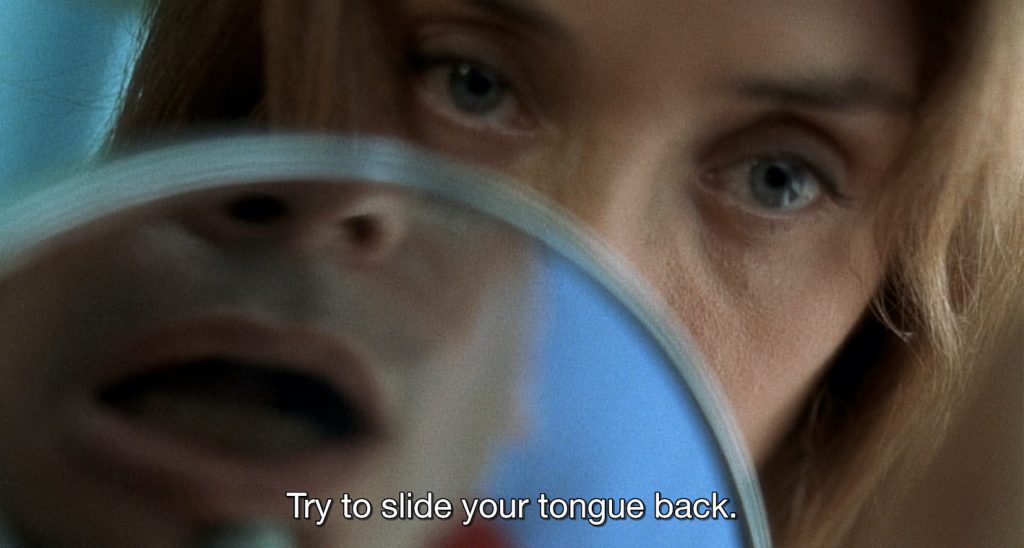
Excerpt: “The film’s essential intervention, then, lies in closing this ironic distance between the felt experiences of artist and audience. The book describes Bauby’s frustration, while the film dares to induce it. This shared experience is catalyzed by what has to be the most extraordinary use of literal first-person perspective in the history of cinema, a sustained experiment in intensive vision (persisting over one-third of the film’s duration) that conscripts the entire body of the viewer, inducing effects – not only psychological but physical – that extend beyond the strict register of the visual.” Read the full article here
View Gregory Brophy’s video essay Untouchable
Linda Ai-Yun Liu, “The Dubious Logic of Sacrifice: Motherhood, Crisis, and Social Reproduction in Advantageous (2015)”
By Linda Ai-Yun Liu

Excerpt: “In exploring both the rewarding and oppressive aspects of this kind of future-oriented status work, Advantageous implicitly links the intimate realm of family reproduction with newer forms of social control at work in contemporary late capitalist societies. We might even say that the film illustrates how the labor of mothering – traditionally associated with an intimate private sphere set apart from impersonal market relations – can be a key locus for the workings of what Gilles Deleuze calls a ‘control society.’ In this post-industrial iteration of Foucault’s disciplinary society, power operates less through the physical enclosure of bodies (e.g. factories, schools) than via the kinds of ‘competitive economic positioning [that] opposes individuals against one another and divides each within.’ A mother’s drive to make sacrifices in order to safeguard her daughter’s status, as Advantageous shows, can be a remarkably efficacious avenue for social control.” Read the full article here
“‘I Am (Not) Major’: Anti-fan Memes of Paramount Pictures’ Ghost in the Shell Marketing Campaign”
By James Rendell
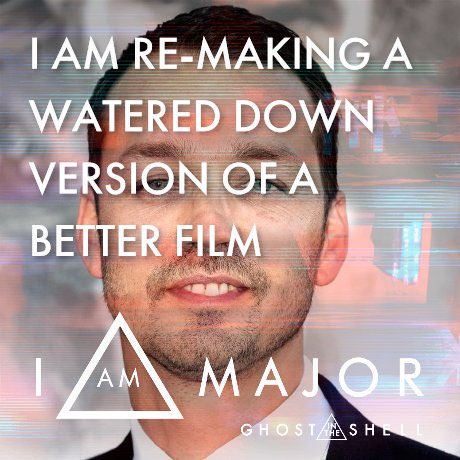
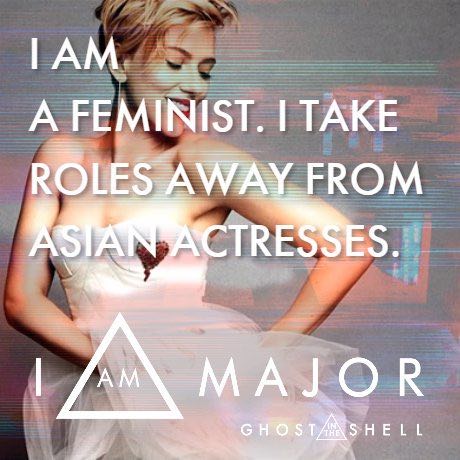

Excerpt: “Paramount inadvertently, and somewhat naively, neglected to note how memes (fundamentally a form of grassroots user-created content) are often used to subvert ‘the meaning of the picture [used and to] … negotiate and at times subvert the meaning of a text by … providing a humorous commentary’ (Harman and Jones 2013, 954–5), and/or political engagement (Dean 2019). It is perhaps unsurprising, then, that users used the meme generator’s own functionality to undermine Paramount’s trailers. In this instance, memes demonstrate audiences’ specific discourses, meaning-making, and ‘affective registers’ of response to the trailers (Bore 2017, 13). Meme affective rhetoric manifests in four principle and interconnected discourses, demonstrating coalitional and intersectional anti-fan stances towards the remake (Gray 2019).” READ THE FULL ARTICLE HERE.
Read James Rendell’s conversation with Kristin Warner about the politics of casting and media fandom.
“The End of Intimate Politics in Yorgos Lanthimos’ The Lobster”
By Hannah Stark and Timothy Laurie

Excerpt: “Firstly, Lanthimos’ film registers a widespread exhaustion with political utopias and reveals the way that both normative and antinormative practices emerge as related social formations. The Lobster is both a satire of compulsory coupling and an equally damning critique of libertarian individualism as an alternative to domestic monogamy. As Annemarie Jagose has recently argued, a politics focused on antinormativity does not necessarily produce the social outcomes that many working in feminist and queer scholarship seek to achieve. Queer critical frameworks must be able to account for the ways that certain antinormative practices – and in particular, libertarian withdrawals from social relations of reciprocity – may curtail experimental conceptions of intimacy and, perhaps, love.” Read the full article here
Tory Jeffay, “‘Flat-Out’ Formalism: Strong Island as Trans-of-Color Critique”
By Tory Jeffay
2020 Queer and Trans Caucus Chris Holmlund Graduate Student Writing Prize

Excerpt: “This article analyzes Strong Island as a film carefully attuned to the grammatical arrangement of its cinematic elements in response to the raced and gendered threats of representation. I describe Strong Island’s visual grammar as an aesthetic of flatness, a term that characterizes the visual treatment of the image, while also encompassing a critique of the logic of the trial system and the ostensible objectivity of the documentary film. Within Ford’s film, visual evidence is presented to the camera’s lens, but, through an aesthetic of flatness, the viewer is denied entry into the diegetic world.” READ THE FULL ARTICLE HERE.
Reviews
Contemporary Cinema and the Philosophy of Iris Murdoch by Lucy Bolton
Reviewed by Geetha Ramanathan
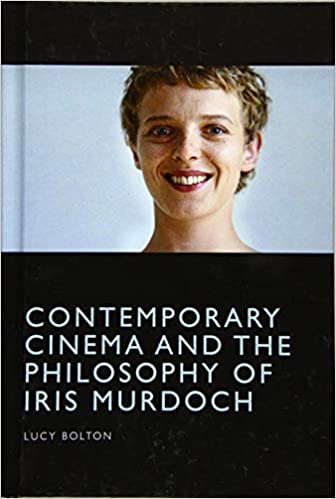
Excerpt: “Comparing film to the moral fable – a genre that combines the oral, the narrative, the literary and the philosophical – Bolton follows the moral progress of the protagonists in three films: Margaret (Kenneth Lonergan, 2011), Blue Jasmine (Woody Allen, 2013) and Compliance (Craig Zobel, 2012). In each case, the viewer’s determined judgment is shaken as she/he begins to understand the repercussions moral choices have on the everyday lives of people. The films leave the viewer with no sense of closure, but rather, insist that we continue to try and understand moral choices from diverse perspectives. We have left our initial complacent decisions far behind. For the Brechtian, such a stance can seem awkward at best, and dangerous at worst. Both in this chapter, and in a later chapter that discusses Elle (Paul Verhoeven, 2016), Bolton does not insist on empathy at all costs for all sorts as that could well veer towards what Murdoch might regard as ‘bad art.’” READ THE FULL REVIEW HERE
Her Stories: Daytime Soap Opera & US Television History by Elana Levine
Reviewed by Lauren Wilks
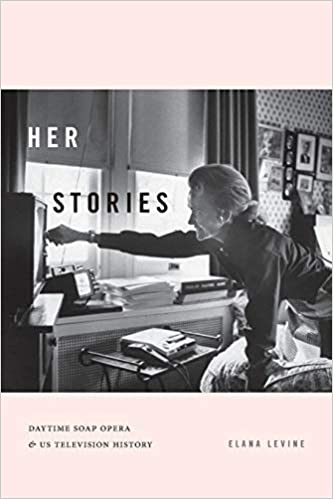
Excerpt: “With Her Stories, Levine contributes a valuable refocalization of the history of American television. By using soaps as a through line, Levine provides profound insights into the shifting standards, approaches, and trends that shaped representation and industrial structure over the course of seven decades. Her Stories makes visible how American television envisioned and interacted with its audiences, both real and imagined, through a comprehensive analysis of one of television’s most long-standing and impactful genres.” READ THE FULL REVIEW HERE
Cold War Cosmopolitanism: Period Style in 1950s Korean Cinema by Christina Klein
Reviewed by Ervin Pavleković
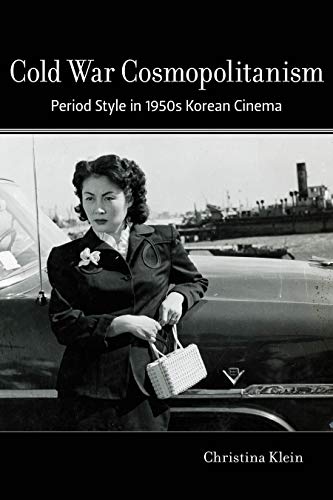
Excerpt: “‘Feminism is an important aspect of Klein’s analysis throughout her book, examining the role of women in South Korean society in both wartime and postwar contexts. She notes a change in the position of women from that within a closed patriarchal system to that in which a woman is independent, emancipated and has certain rights. Furthermore, Klein deals with post-war feminism in part through a discussion of Helen Kim and Lee Tai-young, two women from the public sphere of life who, through their work, sought the future and raised awareness of women’s rights in Korea. In doing so, they defied the established Confucian view of women and the family, which largely marked Korea in the 1950s.” READ THE FULL REVIEW HERE
